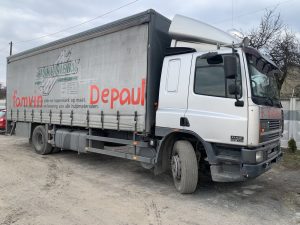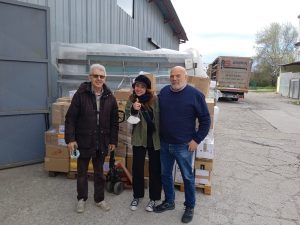by Ruby Wright, Media Consultant, Depaul International
On 24th February, Ukraine was invaded. As soon as this happened, Depaul Slovakia started transporting humanitarian aid across the Slovakian border into Ukraine, the first organisation to do so.
I spoke to Zuzana Kuľhová, Humanitarian Coordinator Depaul Slovakia about how the organisation quickly adapted from focusing on domestic homelessness, to operating a humanitarian response.
Hello Zuzana, can you tell me what it was like working for Depaul Slovakia when Ukraine was first invaded?
“We quickly mobilised to support our colleagues and neighbours, Depaul Ukraine. In Slovakia, we are perfectly placed to purchase and transport humanitarian aid over the border, and Depaul Ukraine ensures it gets to where it is needed in the country. We are one of the few international charities regularly getting aid into Ukraine.”
Your role must have changed a lot since the invasion, what has it been like for you personally?
“My role has changed dramatically over the past two months. This summer, I will have been at Depaul for three years. I usually work as a Funding Officer, but I am currently working as a Humanitarian Coordinator. When the invasion started, it was all hands-on deck, and my usual job was, and still is, put on hold while we prioritise getting aid into Ukraine.
I work closely with an amazing Ukrainian priest, Father Vitaliy, who lets me know what’s needed on the ground. Time has flown by and it feels like we have been working like this for much longer than two months! As Fr. Vitaliy says, ‘war has no weekends”.
What do you on a day-to-day basis?
“My team and I are responsible for coordinating the movement of humanitarian aid from Slovakia into Ukraine. We liaise daily with our Ukrainian colleagues, including Fr. Vitaliy, to find out what people need, and at the moment it’s food and medicine. It is important that the food is easy to transport and doesn’t require cooking”.
“We could send a delivery to a community, and the next day the area could be heavily bombed, leaving the people with no electricity to heat food.”
“We must provide the right aid for the environment. Closer to the borders, people tend to ask for blankets and sleeping bags as they are on the move and are sleeping wherever they find shelter, so we factor this into the aid deliveries “.


It sounds stressful, but hopefully also rewarding?
“Being a Humanitarian Coordinator is stressful, but it is all worth it when I hear that aid has arrived safely in places like Kyiv and Kharkiv. People in Ukraine are going through hell – it’s something I cannot even begin to imagine. Everyone I know in Slovakia wants to help, so I feel privileged that my job enables me to support the people of Ukraine. This war is part of us, it is happening just a few kilometers across our border.”
What advice would you give to people wanting to help?
“We have been overwhelmed by people’s generosity. If people would like to support, I would advise giving donations to charities, as opposed to sending goods to the Ukrainian borders. We are in touch with our colleagues in Ukraine every day, so we know what people need (exact needs can change daily). It is so important to provide the right aid effectively.”
What’s next for you, Zuzana?
“Depaul Slovakia is building the structures for a large-scale humanitarian response with a dedicated humanitarian staff. Soon, I will need to return to my fundraising job, but I will stay involved with our humanitarian response. I am proud that we adapted and responded so quickly and that I was able to play a key role.”
Thank you for taking the time to talk to me, Zuzana. You and your team are doing amazing work.
To support our work in Ukraine, please go to our Depaul Ukraine Emergency Appeal page.